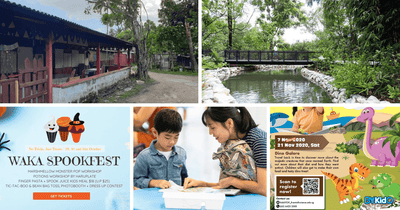Check out the list perfect for families in Singapore!
The sentiment that Singapore is getting expensive to live in must be a common one shared among many. Quite reasonably, families with children are one of the groups that feel this most intimately, but did you know that there are financial assistance and grants offered for families in Singapore. From pre-natal, lifestyle, education to medical, we sift through a few that parents (/to-be) absolutely need to know about!
*Refer to official sources for most accurate information.
PRE- AND POST-NATAL

Medisave Maternity Package (MMP)
Who: Medisave account holders who are using services provided by public or private healthcare institutions in Singapore
What:
-
Pre-delivery and delivery expenses, as well as hospital charges
-
Up to $900 claim for pre-delivery medical expenses such as pre-natal consultations, ultrasound scans, tests and medication
-
Claim ranging from $750 to $3,950 incurred for delivery, subject to the choice of procedure
-
$550 a day claimable for initial two days of hospital admission and $400 from the third day
How: Have your pre-delivery medical bills ready for submission to your choice of hospital and specify you will like to deploy funds from your Medisave. Your hospital will process your submission for the CPF Board to handle both pre-delivery and delivery expenses. Do note that there is a cap to your claimable Medisave amount, by the total bill or withdrawal limit, whichever is lower.
Find out more here.
Medisave Grant for Newborns (MGN)
Who: All Singapore Citizen newborns
What: Up to $4,000 will be auto-credited to each Singapore Citizen newborn's CPF Medisave account, opened within one week from birth registration and acquiring Singapore citizenship.
Accounts are opened automatically for newborns. Covers MediShield Life premiums, recommended childhood vaccinations, hospitalisation, and approved outpatient treatments
How: No application is required as accounts are opened automatically for newborns. Parents can check your children’s CPF account online with your own.
Find out more here.
Child Development Account (CDA)
Who: Children who are Singapore Citizens, and born on or after 14 February 2023, to lawfully-wedded parents
What: A special savings account for children, which can be used by parents for defraying child-raising costs. An enhanced CDA benefit - First Step Grant – auto-credits $5,000 into the CDA upon account opening. Additionally, eligible Singaporean children will enjoy having the government co-matching CDA savings, up to a cap of $4,000 for the first child, $7,000 for the second child, $9,000 for the third and fourth child, and $15,000 for the fifth child and beyond.
How: Parents can apply through the Baby Bonus Scheme at LifeSG:
-
Bundled service together with child’s birth registration
-
Direct application for child who has already registered for birth
Find out more here.
Baby Bonus Scheme
Who: Any Singaporean child under 12 years old and fulfils any of the following criteria:
-
has registered their birth
-
was born overseas
-
recently obtained citizenship; or
-
was adopted
* Parents who have just conceived should proceed straight to register your child’s birth, as the Baby Bonus application will be submitted together
What: Comprising three components including:
-
a cash gift to help with financial costs of raising a child, this is deposited into the Child Savings Account (CSA) every half-annually till the child is 6.5 years old and the earlier mentioned First Step Grant and government co-matching
How: Parents can apply here.
Find out more here.
PARENTAL LEAVE & CHILDCARE
Government-Paid Maternity Leave (GPML)
Who: Working mothers whose children become Singapore citizens at birth or become Singaporeans within 12 months from birth (inclusive of date of birth)
What: Up to 16 weeks of leave, to be taken within 12 months from the child's date of birth (inclusive of date of birth). For the first and second child, employers will pay for the first eight weeks of GPML at the mother’s gross rate of pay, and reimbursing the ninth to 16th week of GPML, capped at $10,000 per four weeks or a total of $20,000 per child order. For the third and subsequent child, the government will reimburse all 16 weeks of GPML, capped at $10,000 per four4 weeks or a total of $40,000 per child order.
How: Working mothers should give employers at least four weeks' notice before going on maternity leave, and submit necessary supporting documents at least four weeks before the start of GPML. These will facilitate employers following up with their own necessary procedures to submit your eligibility to the government. Application for GPML is also subject to employers’ leave procedures.
Find out more here.
Also check out Shared Parental Leave.
Government-Paid Paternity Leave (GPPL)
Who: Working fathers whose children are Singapore citizens, and lawfully married to the child’s mother between conception and birth, or within 12 months from the child's date of birth.
What: Two weeks of GPPL for fathers whose children are born before 1 April 2025, with an additional two weeks subject to employers’ consent. For children born on or after 1 April 2025, fathers are entitled to four weeks of GPPL. Note that the GPPL entitlement per week depends on number of workdays per week. Employers are required to pay working fathers during the leave period, then claim reimbursement for all four weeks of the GPPL for fathers whose children are born on or after 1 April 2025, capping at $2,500 per week or a total of $10,000.
How: Provide employers with four weeks' notice before going on GPPL. Any shorter notice period is subject to employers’ consent. Application for GPPL is also subject to employers’ leave procedures.
Find out more here.
Also check out Shared Parental Leave.
Unpaid Infant Care Leave (UICL)
Who: Eligible working parents including adoptive, foster parents, step-parents and legal guardians
What: 12 days of unpaid leave per relevant period for working parents with Singapore citizen children below two years old. Relevant period refers to calendar year or any 12-month relevant period with mutual agreement between employer and employee. For self-employed parents or if there is no mutual agreement with employers, the 12-month relevant period will be the calendar year by default.
How: Application is subject to employers’ leave procedures.
Find out more here.
Infant & Childcare Subsidy
Who: All Singapore Citizen children enrolled in an ECDA-licenced infant or childcare centre
What: Basic Subsidy for all eligible children. An Additional Subsidy applies for main applicants (mothers or single father) working at the point of the subsidy application, with the family's gross monthly household income (HHI) at $12,000 or below or per capita income (PCI) of $3,000 or below for households consisting of five or more family members who are related by blood, marriage, and/or legal adoption, and who share the same registered residential address.
The table below is a guide showing preschool subsidies that eligible children enrolled in a full-day infant or childcare programme may receive.

How: Apply here.
Find out more here.
EDUCATION

Photo credit: MOE
Did you know that parents can use CPF savings to pay for children’s subsidised diploma or degree courses at approved institutions in Singapore? Repayment of the principal amount with interest is required when the children are of suitable age, returning funds to the CPF account. Below are other education financial schemes available in Singapore too.
Kindergarten Fee Assistance Scheme (KiFAS)
Who: Singapore Citizen children enrolled in MOE kindergartens and Anchor Operators (AOP), with monthly gross household income (HHI) at $12,000 or less, or per capita income (PCI) at $3,000 or less (for households with 5 or more members).
What: A minimum co-payment amount is the minimum amount of programme fees after KiFAS subsidies, with the amount increasing progressively subject to household or per capita income rises. For an estimate of this amount, refer to Kindergarten Fee Assistance Scheme (KiFAS) tables.
How: Kindergartens will assist parents with application at the point of children’s enrolment. Or apply here.
Find out more here.
MOE Financial Assistance Scheme (MOE FAS)
Who: Eligible Singapore Citizens (SC) studying in the following schools or institutions:
-
Government and government-aided schools
-
Government-funded special education schools
-
Independent schools
-
Specialised schools
-
Some specialised independent schools: NUS High School of Mathematics and Science and the School of Science and Technology
-
Government-funded post-secondary education institutions: Institute of Technical Education, polytechnics, autonomous universities and arts institutions and National Institute of Early Childhood Development (NIEC).
What: Financial coverage for school fees and miscellaneous expenses
How: Via the child’s school
Find out more here.
MOE Tuition Fee Loan (TFL)
Who: Students studying full-time in MOE-subsidised diploma courses in any of the local polytechnics, and undergraduate and postgraduate programmes in the autonomous universities
-
Singapore Citizen and Singapore Permanent Resident (PR) students studying full-time MOE-subsidised diploma and undergraduate programmes in LASALLE or NAFA
-
Singapore Citizen students studying part-time MOE-subsidised undergraduate programmes in the autonomous universities
What: Interest-free during the course of study, with interest starting only upon a student’s graduation or leaving the institution, for the following students:
-
Polytechnic, LASALLE or NAFA diploma students
Loan coverage up to 75% of subsidised tuition fees payable
-
Autonomous university students, or LASALLE or NAFA undergraduates
Loan coverage up to 90% of the subsidised SC tuition fees
How: Approach the following banks for:
-
Nanyang Technological University and National University of Singapore students: DBS or OCBC
-
Singapore Management University: OCBC
-
All other students: DBS
Find out more here.
OTHERS
MediShield Life Coverage
Who: All Singapore Citizens from birth
What: Mandatory basic health insurance comprising benefits for inpatient, day surgery and outpatient treatments, as well as coverage extending to Serious Pregnancy and Delivery-related Complications.
How: Auto-inclusion for all eligible.
Find out more here.
Qualifying Child Relief (QCR)/ Child Relief (Disability)
Who: Parents who have been maintaining children, fulfilling the following criteria:
-
Child is unmarried and was/is born to applicant and ex/spouse, a step-child or legally adopted
-
Child was below 16 years old or 16 years old or above studying full–time at any university, college or other educational institution at any time in the year
-
Child did not have an annual income exceeding $8,000
What: Qualifying child relief amount $4,000 or $7,500 per child.
How: Fill in the Child Relief section when filing IRAS Income Tax.
Find out more here.
National Childhood Immunisation Schedule (NCIS)
Who: From birth to 18 months of age
What: Recommended childhood vaccinations as basic standard of care, for protection against vaccine-preventable diseases that are of significant healthcare burden to Singapore or would be so without these vaccinations. Coverage includes 14 diseases comprising tuberculosis, hepatitis B, diphtheria, tetanus, pertussis, poliovirus, Haemophilus influenzae type b, measles, mumps, rubella, varicella (chickenpox), pneumococcal disease, human papillomavirus and influenza. Of these, vaccinations against measles and diphtheria are compulsory for children under the Infectious Diseases Act.
Find out more here.
Lastly, don’t forget that all Singaporean newborns are eligible for a fee waiver for their first passport application if it’s submitted on or before the child’s first birthday, so do so at MyICA.
*Refer to official sources for most updated and accurate information.







